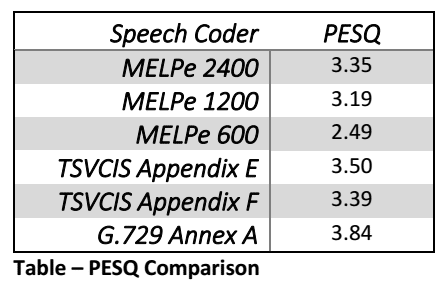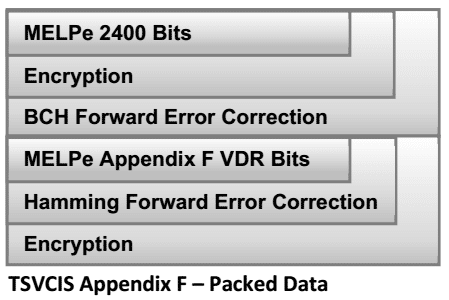MELPe TSVCIS Vocoder Software
Tactical Secure Voice Cryptographic Interoperability Specification (TSVCIS) was developed to provide interoperability between Waveforms utilizing different vocoder rates, levels of encryption and forward error correction.
TSVCIS specifies both Narrowband (NB) and Wideband (WB) Waveforms, which provides the framework for improved speech intelligibility, security, and robustness of defense radio communications. The NB Waveform implements MELPe at the standard data rates (2400, 1200 and 600 bps). In the WB Waveform the bit rates of MELPe have been extended to include data rates of 8000, 12000 and 16000 bps. This allows for the radio users to selectively determine the characteristics of the radio communication. If the radio communication is noisy, a lower MELPe rate can be selected and the number of parity bits used for the FEC can be increased. On the other hand, a higher MELPe bit rate can be selected to improve the intelligibility of the speech, if the channel’s error rate is low. TSVCIS was designed to be inter-operable with SCIP-215/SCIP-216 Secure Communications Interoperability Protocol devices so the MELPe bit rate extensions were designed to easily switch back to using standard Narrowband MELPe.
VOCAL Technologies, Ltd. provides software solutions for core TSVCIS requirements:
- VOCAL’s enhanced Mixed-Excitation Linear Predictive (MELPe) vocoder based on STANAG 4591
- VOCAL’s implementation of Naval Research Laboratory (NRL) Variable Data Rate (VDR) vocoder. Floating point and
optimized Fixed Point variations available. - Forward Error Correction (FEC) software, both BCH and Hamming codes as specified by TSVCIS
- Unclassified Advanced Encryption Standard (AES) cryptography
Our TSVCIS software is available either standalone, as an embedded software library, with a VoIP stack or as part of a complete design.
TSVCIS Narrowband Data Modes
The foundation of the speech coding for TSVCIS is the (MELPe) vocoder, which is commonly known in the U.S. as MIL-STD-3005 and in NATO as STANAG 4591. There are five main Narrowband(NB) Data Modes, in which TSVCIS utilizes all three rates of MELPe (2400 bps, 1200 bps and 600 bps). It is recommended to utilize the noise pre-processor (NPP) of MELPe. The NPP adaptively estimates the noise spectrum of the input speech signal and attenuates the noise components and enhances the speech.
All NB data modes encrypt the MELPe bits. Two of the modes use Bose-Chaudhuri-Hocquenghem (BCH) Forward Error Correction (FEC) to provide better protection against channel errors.



TSVCIS Wideband Data Modes
TSVCIS specifies five different Wideband(WB) Waveforms. All modes encode speech at 8kHz based on the STANAG 4591 MELPe 2400bps, but offer expanded data rates of 8000, 12000 and 16000 bps. Two of the modes require an additional MELPe-base multi-rate speech coder. This Variable Data Rate (VDR) vocoder encodes a different number of bits based on the mode selected. Four of the modes use Forward Error Correction (FEC) to provide better protection against channel errors. It is required to utilize the noise pre-processor (NPP) of MELPe. The NPP adaptively estimates the noise spectrum of the input speech signal and attenuates the noise components and enhances the speech. All WB data modes encrypt the MELPe bits.e Interface

TSVCIS Appendix E – WB Voice 16 without FEC
This Wideband Data Mode has a data rate of 16000bps with a frame length of 22.5ms. This mode incorporates the 54bits MELPe 2400, along with an additional 280 bits from the MELPe VDR speech coding. This mode is intended for channels with low bit error rates (BER) as no FEC is applied, but provides improved speech quality over MELPe 2400.

The TSVCIS Appendix E speech coder first applies the NPP to the input speech samples and the result is encoded by MELPe 2400. The NPP samples and the MELPe 2400 data are used to further encode the sample data. Finally, the MELPe 2400 and VDR bits are encrypted.

VOCAL offers optimized MELPe 2400, MELPe VDR, AES encryption software for support of this TSVCIS mode.
TSVCIS Appendix F – WB Voice 16 with FEC
This Wideband Data Mode has a data rate of 16000bps with a frame length of 22.5ms. This mode incorporates the 54bits MELPe 2400, along with an additional 120 bits from the MELPe VDR speech coding, 110 parity bits from FEC of the MELPe 2400 data, and 55 parity bits from FEC of MELPe VDR data. In channels with high BER, the FEC bits help maintain the speech quality.

The TSVCIS Appendix F speech coder first applies the NPP to the input speech samples, and the result is encoded by MELPe 2400. The NPP samples and the MELPe 2400 data are used to further encode the sample data. In Appendix F, FEC is applied pre-crypto on the VDR bits and post-crypto on the MELPe bits.

VOCAL offers optimized MELPe 2400, MELPe VDR, BCH FEC, Hamming FEC, AES encryption software to support this TSVCIS mode.
TSVCIS Appendix G – WB Voice 16 Gateway
This Wideband Data Mode is designed to be used at a Gateway between narrowband and wideband waveforms. All widebands modes use MELPe 2400 to be interoperable with NB modes. This wideband mode has a data rate of 16000bps with a frame length of 22.5ms. This mode incorporates the 54bits MELPe 2400, along with 110 parity bits from FEC of the MELPe 2400 data. At the moment, this does include a large number of unused bits provisioning for future applications of which may combine voice and data services.
The WB Voice 16 Gateway Encoder receives data from the NB waveform and extracts the encrypted MELPe 2400 bits andapplies BCH forward error correction.

VOCAL offers optimized BCH encoder and decoder software for support of this TSVCIS mode.
TSVCIS Appendix H – WB Voice 12
This Wideband Data Mode has a data rate of 12000bps with a frame length of 22.5ms. This mode incorporates the 54bits MELPe 2400, along with an additional 180 parity bits from FEC of the MELPe 2400 data. WB Voice 12 provides two layers of FEC, making this mode preferred for channels with very high bit errors.
The WB Voice 12 Encoder first applies the NPP to the input speech samples, and the result is encoded by MELPe 2400. The MELPe Bits are twice encoded by BCH FEC. The MELPe 2400 Bits are encrypted.

VOCAL offers optimized MELPe 2400, both BCH FEC encoders and decoders and, AES encryption software to support this TSVCIS mode.
TSVCIS Appendix I – WB Voice 8
This Wideband Data Mode has a data rate of 8000bps with a frame length of 22.5ms. This mode incorporates the 54bits MELPe 2400, along with an additional 110 parity bits from FEC of the MELPe 2400 data. In channels with high BER, the FEC bits help maintain the speech quality.
The WB Voice 8 Encoder first applies the NPP to the input speech samples, and the result is encoded by MELPe 2400. The MELPe Bits are encoded by BCH FEC. The MELPe 2400 Bits are encrypted.

VOCAL offers optimized MELPe 2400, BCH FEC encoder and decoder and, AES encryption software to support this TSVCIS mode.
TSVCIS Software Summary
- Includes MELPe 2400, 1200, 600 bps data rate of STANAG 4591
- Wideband Voice 16 without FEC (TSVCIS Appendix E)
- Wideband Voice 16 with in-band FEC (TSVCIS Appendix F)
- Wideband Voice 16 Gateway – Narrowband – Wideband Crossbanding (TSVCIS Appendix G)
- Wideband Voice 12 with in-band FEC (TSVCIS Appendix H)
- Wideband Voice 8 with in-band FEC (TSVCIS Appendix I)
- Wideband Modes E and F Based on Naval Research Lab’s (NRL’s) Variable Data Rate (VDR) Speech Codec
- Forward Error Correction BCH and Hamming for increased resiliency to channel bit errors.
- AES Encryption
- Scalable narrowband voice codec augmenting the MELPe encoded parameters
- Uses a variable number of LSF parameters packed into octets (up to tcmax)
- Gateways/receivers may pass/use fewer LSF octets
- Transcoding software allows for the conversion between TSVCIS WB/NB modes and legacy military radios that use
CVSD or LPC-10 - C Callable Interface
Platforms
VOCAL’s optimized vocoder software is available for the following platforms. VOCAL has updated its MELPe offering to include TSVCIS MELPe variations. In addition, VOCAL also offers FEC software to complement our TSVCIS MELPe. Please contact us for specific TSVCIS codec supported platforms and performance information.
Processors | Operating Systems |
· Texas Instruments – C6000 (TMS320C62x, TMS320C64x, TMS320C645x, TMS320C66x, TMS320C67x), DaVinci, OMAP, C5000 (TMS320C55x) · Analog Devices – Blackfin, TigerSHARC, SHARC · PowerPC · MIPS – MIPS32, MIPS64, MIPS4Kc · ARM – ARM7, ARM9, ARM9E, ARM10E, ARM11, StrongARM, Cortex-A8/A9, Cortex-A53,Cortex-M3/M4/M7 · Intel / AMD – x86, x64 (both 32 and 64 bit modes) | · Google Android · Apple iOS / iPhone / iPad & MacOS · Unix, Linux, μClinux, BSD · Microsoft Windows ACM / RTC / CE / Mobile · Symbian · eCOS / eCOSPro · Wind River VxWorks · Green Hills Integrity · VOCAL LANsEND · Micrium μCOS |
